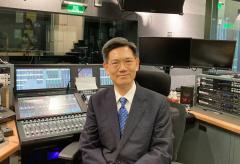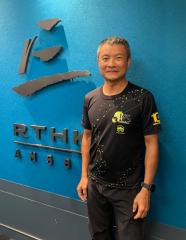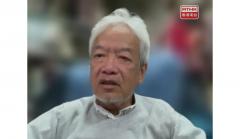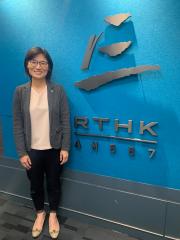簡介
Listen to #Hashtag Hong Kong every Sunday morning at 8.15
Focussing on issues affecting civil society, we'll hear from representatives of NGOs, associations, statutory bodies, and non-profit groups.
(Sundays 8.15am - 8.25am)
最新

Dr. Anthony Ying, the Chairman of the Cancer Prevention/Early Detection Subcommittee of the Hong Kong Anti-Cancer Society
I am Dr. Anthony Ying, the Chairman of the Cancer Prevention/Early Detection Subcommittee of the Hong Kong Anti-Cancer Society as well as an oncologist in Hong Kong. As pioneers in promoting cancer education, we, at the Hong Kong Anti-Cancer Society, recognise the significance of May as Skin Cancer Awareness Month. As summer approaches, let us emphasise the critical importance of raising awareness about this form of cancer.
Skin cancer is a prevalent disease and skin cancer is actually the commonest human cancer. Its global incidence rate is rapidly increasing. Although the rate in Hong Kong is comparatively lower than in the West, the number of new cases continue to rise each year. This can be attributed to increased participation in outdoor activities and an ageing population. In fact, there were 1200 new cases of skin cancers reported in Hong Kong in 2021.
It is crucial to dispel the misconception that skin cancer only affects individuals with fair skin. Regardless of skin color, anyone can develop skin cancer. In fact, certain factors increase the risk, including having numerous moles especially atypical moles, a history or family history of melanoma, prolonged exposure to sunlight, a history of severe sunburns with skin peeling and fair skin that easily burns.
Recognising the signs and symptoms of skin cancer is important. Different types of skin cancer can present varied appearances, but common symptoms include the presence of a new spot that differs from surrounding skin, a non-healing sore, or a mole or spot that changes in size, shape, or color. It is important to be vigilant for moles that exhibit asymmetry, irregular or indistinct borders, uneven color distribution, a diameter exceeding 6 mm, or a raised surface with an irregular shape.
While the incidence of skin cancer is high, its mortality rate is relatively low, provided it is not melanoma. Since our skin is a visible organ, skin abnormalities should be visible and detectable. Early detection plays a vital role in increasing the chances of successful treatment. If you notice any unusual changes in your skin, I urge you to visit your doctor without delay. Prompt consultation is critical. If your doctor suspects skin cancer, a biopsy will be recommended—a quick and simple procedure that removes a small piece of skin from the suspicious area under local anesthesia. The sample will then be sent to a laboratory for microscopic examination.
Research indicates that 80% of skin cancers are preventable. Protecting our skin from the sun is the best preventive measure. Here are some essential tips to follow: Avoid the sun when the UV Index is high and when the sun rays are strongest near mid-day. Use sunscreen with a sun protection factor (SPF) of 15+ and PA++ on all exposed skin, including the lips.
Apply sunscreen 30 minutes before sun exposure and reapply every 2 to 3 hours.
Seek shade under trees or umbrellas when the sun is very strong.
Wear hat, sunglasses, and suitable clothing that protect your skin.
Avoid tanning beds and sunlamps.
The Hong Kong Anti-Cancer Society offers comprehensive cancer care and education, including services for skin cancer. To assess your risk of developing skin cancer, I encourage you to join our free cancer screening programme. Our dedicated nurses will conduct a cancer risk assessment and provide personalised advice and referrals. Free leaflets on various types of cancers and short videos about cancer are also available on our website www.hkacs.org.hk and our YouTube channel.
For those diagnosed with skin cancer requiring additional support, please dial 3921 3777 to connect with our Cancer Survivorship Care Project for free. Our professional social workers and nurses are available to provide counselling and support during your journey. Our publication "A-Z Guide for Caregivers," edited by Ms. Janet Wong, also offers comprehensive information for cancer caregivers.
Or if you require rehabilitation, our Cancer Rehabilitation Centre offers holistic care services tailored to your needs. We particularly have a Charity Bed Program that provides free in-patient care services for those in need.
All the cancer support and services mentioned above are made possible through generous donations. We welcome you to donate to our cause if you would like to make a tangible difference in the lives of those affected by cancer.
Lastly, I would like to dedicate the inspiring song 'We Are the Champions' to highlight the importance of solidarity and collective effort in the fight against skin cancer. Let this song serve as a cheerful reminder that together, we stand united, cheering on these brave fighters!
重溫
Phoebe See , Coordinating Secretary of The Chinese YMCA of Hong Kong
Hi I am Phoebe See Man-yan, the Coordinating Secretary of The Chinese YMCA of Hong Kong.
Photographs and videos capture the joyous moments and giggles of family gatherings. Parents would often like to cherish every second and tell the world that their children are the prettiest and most precious thing to them.
Nowadays, "sharenting" has become a popular trend wherein parents eagerly upload photographs or videos featuring their children to various social media platforms. Regrettably, this seemingly innocuous act may cause emotional distress in some children, making them feel uncomfortable and embarrassed.
The Chinese YMCA of Hong Kong interviewed around 800 parents and 1,100 primary and secondary school students from September to November last year. The findings revealed that more than 80% of the surveyed parents shared their children's information on social media platforms, with nearly 32% sharing across multiple platforms. However, approximately 30% of parents did not obtain their children's consent before sharing photos or videos online, and nearly 40% rarely or never discussed their habits of sharing their children's information. Moreover, nearly 60% of surveyed parents believed that sharing their information would not cause their children to experience negative emotions such as embarrassment, annoyance, or anger.
In terms of children's perspectives, nearly half of those surveyed were aware that their parents shared details about their daily lives online. In some cases, parents even created separate accounts just for this purpose. The children polled generally believed that parents should obtain their consent before sharing their information online, and more than 70% preferred that their parents not share their personal information online. Furthermore, nearly 30% were annoyed, while over 20% were angry at their parents for sharing their information without their consent.
We recognize that parents often feel proud of their children's accomplishments and feel compelled to share these moments with others. However, oversharing may have negative outcome for their children. These include issues arising from the disclosure of personal information and the emergence of trust issues between parents and children, which negatively impact their relationship.
Children of different age groups all need to feel safe and loved, and starting at the age of 7, they begin to desire respect. If these developmental psychological needs are not met, children may easily become passive, withdrawn, insecure, lacking trust in others, and struggling to establish relationships. They may even exhibit rebellious behaviour and resist actions that do not show them respect.
Furthermore, "sharenting" may have unintended consequences, including the risk of jealousy and cyberbullying. Many parents see it as an adorable moment shared on social media, but it may disturb other children in the same picture as well. The worst-case scenario for the long-term consequences of "sharing" is that the children grow up only to discover that every intimate detail of their lives has been exposed online. These unerasable data are not only embarrassing but may also encourage criminals to use them for illegal activities.
The Chinese YMCA proposes using the concept of "S.U.M.", that means Support, Understanding, and Mindfulness as a guiding principle for parents. As we encourage parents to practice mindfulness and be aware of their own internal needs, we also encourage introspection when seeking attention from the others. Parents should consider their motivations for sharing online, such as validation, social connection, or bonding with their children only. After all, parents' genuine affection for their children is more important than the number of “social media likes” they received.
As technology continues to advance, it becomes crucial for parents to be mindful of the information they share about their children online. With that in mind, the Chinese YMCA would like to remind parents of a few important points. It is crucial to seek their children's consent before sharing any information about them. Also, parents should avoid exposing personal information about children, such as the full names, school names or whereabouts of their children, or uploading sensitive images of children. Always respect your children's decisions, respect their wishes if they want pictures to be removed.
Before uploading photos of your children, take a moment to consider what needs you are trying to fulfill. Is it a need for approval from others? Is it a desire to feel connected to society? Remember, as a parent, your efforts towards your children deserve self-appreciation. And your love for them doesn't require constant validation through praise from the others.


















